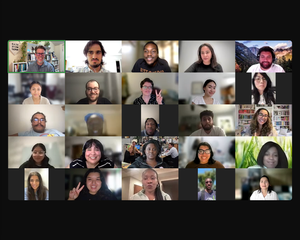Hello everyone!
I’m starting a new chapter today. Actually, I’m starting a whole new book.
For the past six weeks, I’ve been working on the manuscript of a short book about a topic that has informed most of my career: How to write better. Unlike most writing books, this isn’t aimed at the individual writer or would-be author. I’m writing a book aimed at content teams — groups of writers and editors working together to create something collaboratively.
In short, this book will be about how to write as a team.
Writing as a team? What does that mean?
I’ve done a lot of writing and editing as part of collaborative teams. I’ve been a magazine editor, an online news journalist, a freelance writer, an independent content consultant, an in-house communications chief, and the head of editorial at a PR and marketing agency.
Throughout my career, I’ve been part of creating thousands of news stories and blog posts, hundreds of bylines, scores of speeches and presentation talk tracks, dozens of research reports, and many, many other types of content. I’ve contributed to half a dozen print books as an author or editor, helped launch about a dozen publications and blogs, and participated in half a dozen website redesigns. And I’ve taken part in a handful of content management system transitions (excruciatingly painful, every one of them).
In other words, almost all of the content I’ve helped create has been a collaborative effort. And when you’re creating content collaboratively, a host of issues crop up that most writing manuals don’t cover. Issues like these:
- The engineer who wants your team’s help to revise something they’ve written to make it more publishable, but who can’t let go of specific technical descriptions that they insist are necessary for accuracy — which make the copy almost unreadable.
- The top executive who needs your help writing a speech but is so concerned with specific wording that he’s still asking you for revisions backstage, shortly before he’s about to go on.
- The research firm that keeps revising the results of a survey, forcing you to make endless revisions of the supposedly final report up until the day before it’s scheduled to be published.
- The key member of the writing team, brilliant but inconsistent, who decides that they’ve had enough of your feedback and quits, leaving you to scramble to find someone else to cover their responsibilities.
All of these have happened to me and the teams I’ve been part of. In fact, every story above has happened to me multiple times!
In the moment, each of these incidents felt like a crisis. Yet my teams and I delivered the content we needed to, on time and as promised. In some cases what we delivered exceeded expectations, sometimes by far, delivering results that were 10x or 100x the investment our clients had made.
The teams that produced this work were prepared to handle these unexpected curveballs to varying degrees. Sometimes we had a solid game plan, well-organized project management, and all the resources we needed. Other times? Not so much.
The goal: A playbook anyone can use
That brings me to the main reason I want to share what I’ve learned: These issues would be much easier to handle with a good playbook.
The lessons I’ve learned from all these years creating content as part of various teams have, I think, made me a better editor and manager. They’ve certainly helped the teams I’ve been on produce better content. And I think they’re lessons that anyone can learn.
So I’d like to organize some of that knowledge, put it into a usable form, and share it. That’s what I’ve been working on with this book.
(I’ve had time to work on the manuscript in 2024 thanks to a change in employment status — which means I am looking for my next gig. If you know of anyone looking for an editorial and communications leader, could you please point them to my LinkedIn profile?)
There are lots of great books that promise to make you a better writer, and I’ve learned a lot from many of them, from Strunk & White’s Elements of Style to Stephen Pinker’s A Sense of Style. These books are aimed mostly at solo writers. My goal is to create a useful guide to collaborative content creation, one that can help content teams of all descriptions organize themselves more efficiently, do their work more joyfully, and produce work that they’re proud of.
But I can’t do it on my own. (Besides, it would be weird to write a book about team-based writing all by myself, wouldn’t it?) I’ve got a first draft — but to get it to the next level, I need your input. I have a lot of relevant experience, but I’m just one person. I’d like your help to make this book even more broadly applicable.
Over the coming weeks, I’ll be sharing some parts of the book and asking for advice on each piece.
But to start, I have one easy ask: I just want your perspective on collaborative content creation.
If you’ve been involved in collaboratively creating content in any way, please take a few minutes to respond to this post, in a comment or in an email.
I want to hear how you do it — and how the teams you’re part of have been able to create content successfully (or not!).
If you have any other thoughts or comments, please write me at dylan@tweney.com and let me know what works for you. I’m looking forward to hearing from you.
Bonus recommendation
A bonus recommendation for no reason other than the fact that I enjoyed it: The Netflix biopic Maestro is a complicated, artsy, over-the-top profile of a conductor and composer who was complicated, artsy, and over the top: Leonard Bernstein. It’s told in an elliptical, episodic way that makes no attempt to draw a straight (ahem) line through his life. Instead, it’s provocative, poetic, and surprising. After we watched it, KJ and I talked for hours about the stereotypes of genius (and art) that it plays with. I found Maestro to be a lot more nuanced and thought-provoking than Oppenheimer, although if you’re into conflicted 20th-century geniuses, you’re probably watching both.




